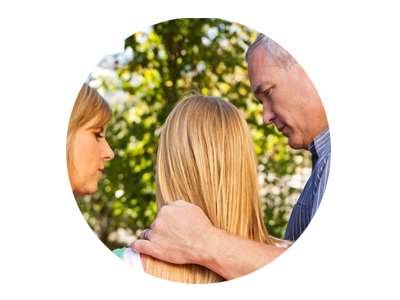It’s important to identify the signs of sexual abuse and abusive behaviors, so that abuse can be stopped as soon as possible — or before anyone is harmed. Warning signs are often seen in concerning behaviors of children, teens and adults. Being able to recognize these behaviors can help you respond appropriately.
SIGNS OF ABUSE
Warning signs may occur in children going through different kinds of trauma or difficult situations. Children and teens may display a wide variety of warning signs. Any one warning sign — or even several — may or may not mean a child has been sexually abused. If you notice behavioral warning signs, remain calm, gather more information, listen carefully and decide if you need help. If you recognize any physical indications, or if a child hints at or discloses sexual abuse, please call the police or child protective services and seek professional help immediately.
WARNING SIGNS IN CHILDREN
If you suspect sexual abuse based on behavior or physical signs, call child protective services or the police and have the child immediately examined by a specially trained medical professional.
Here are some signs to look for:
- Nightmares or other sleep problems without an explanation
- Seems distracted or distant at odd times
- Sudden change in appetite (increase or decrease)
- Sudden mood swings: rage, fear, insecurity or withdrawal
- Leaves “clues” that are likely to provoke a discussion about sexual issues
- New or unusual fear of certain people or places
- Refusal to talk about a secret shared with an adult or older child
- Writes, draws, plays or dreams of sexual or frightening images
- Talks about a new older friend
- Suddenly has money, toys, or other gifts without reason
- Thinks of self or body as repulsive, dirty or bad
- Exhibits new adult-like sexual behaviors, language and knowledge
- Has physical signs of sexual abuse (these are more rare, but may include the following):
- Pain, bleeding, discharge or other physical trauma to the genitals, anus or mouth
- Vaginal infections (girls) or sexually transmitted diseases
- Persistent or recurring pain during urination or bowel movements
- Wetting or soiling accidents unrelated to toilet training
- Trouble swallowing
WARNING SIGNS IN TEENS
If you notice only one warning sign, it may be the result of sexual abuse or of another issue in the teen’s life. Make time to talk and reach out for help. If you recognize multiple indicators in a teen you know, or the teen discloses sexual abuse, call the police or child protective services and seek help immediately.
Behavior more typically found in teens:
- Signs of depression or anxiety
- Self-harming behaviors (cutting, burning)
- Suicidal thoughts or attempts
- Compulsive eating or dieting
- Inadequate personal hygiene
- Drug and alcohol abuse
- Sexual promiscuity
- Running away from home
- Fear of intimacy or closeness
- Extra money or gifts without explanation
WHAT IF YOU AREN’T SURE IF IT’S ABUSE?
Know that you don’t have to face this alone. Sexual abuse thrives in isolation. Find someone you trust that you can talk with. Seek out resources available in your area to help educate yourself about child sexual abuse. As for what to learn, see this short list below:
- Learn the warning signs: It’s up to attentive adults to recognize signs and know what sexual abuse indicators children and teens display.
- Get comfortable talking about this: Often children/teens do not disclose what happened in the first conversation. Children/teens may even test an adult’s reaction before full disclosure. If you are calm, reassuring and comforting, the child/teen may feel comfortable enough to disclose. Sometimes victims of abuse take days, weeks, months or even years to disclose their abuse.
- Understand healthy sexual development: It’s also helpful to understand what healthy sexual development in children/teens looks like. It’s good to know what’s healthy for each age range, what might be concerning and when to call for help.
FOR MORE INFORMATION, VISIT THESE RESOURCES
- Warning sign tip sheet from Stop It Now!
- Warning signs for teens from RAINN
Knowing the warning signs of sexual assault — and how to respond — can help you make a difference for someone you care about. Many victims of sexual assault talk about being afraid they won’t be believed, feeling isolated and being unsure of who to turn to for help and support.
Some of the indicators of sexual assault in adults can also be caused by other sudden life changes or another traumatic event. As a friend or family member, it’s OK to gently ask about what is happening and let them know you care.
Warning Signs in Adults
- Signs of depression or anxiety
- Self-harming behaviors (cutting, burning)
- Suicidal thoughts or attempts
- Compulsive eating or dieting
- Sudden changes in behaviors or unusual changes in mood
- Withdrawn behavior
- Avoiding specific situations, people or places
- Increase in drug or alcohol use or other self-destructive behaviors
- For college students, sudden falling grades or withdrawing from classes or previously enjoyed activities
Adult victims have the choice to talk about what happened to them and whether or not to report their abuse or assault to the police. When high-profile cases and current events in the media focus on abuse or sexual assault, it’s common for adult survivors of sexual assault or childhood sexual abuse to disclose something that may have happened years or even decades ago. You may be the first person they have ever told about their assault. It’s usually helpful to have someone who will listen, believe them, provide support and refer them to a rape crisis center, other trained caring professionals who can help or, if they are ready to report, the police.
FOR MORE INFORMATION, VISIT THESE RESOURCES
- Warning signs for college-aged adults from RAINN
- Tips for talking with survivors of sexual assault from RAINN
- Resources for male survivors from 1 in 6
- Resources for male survivors from MaleSurvivor
Vulnerable populations, including individuals with physical disabilities, intellectual disabilities and elders, have significantly higher incidence of sexual assault than the general population. Individuals with cognitive disabilities are not able to consent to sexual acts because of their inability to understand what is happening (e.g., intellectual disabilities, Alzheimer’s or dementia). For numerous reasons, individuals with physical disabilities may not be able to consent because of physical limitations or power differentials. It may be especially difficult or impossible for these populations to talk about what happened. Therefore, listen or watch carefully for any disclosure of sexual abuse or any unwanted sexual contact. Be particularly aware of any physical signs or behaviors that might indicate abuse.
WARNING SIGNS IN ADULTS WITH DISABILITIES OR ELDERS
- Sudden or significant changes in demeanor, such as showing fear or becoming withdrawn around a specific individual, situation, place or activity
- Bruising in the breast or genital area
- Torn, stained or bloody underclothing or sheets
- Unexplained vaginal or anal bleeding
- Unexplained sexually transmitted infections/diseases/pregnancy
- Evidence of pornographic material being shown to a anyone with diminished capacity
- New vocabulary for body parts or sexual activity
If you suspect that an elder or someone with a physical or intellectual disability is being harmed, be sure to reach out for help. Most states have mandatory reporting laws that include vulnerable populations.
FOR MORE INFORMATION, VISIT THESE RESOURCES
- Information about sexual abuse of elders from the Department of Justice
- State laws related to elder abuse cases from the Department of Justice
- Information about abuse of people with disabilities from Activating Change
- Information about sexual abuse of individuals with intellectual disabilities from The Arc
- Warning signs for elder abuse from RAINN
- Fact sheet on sexual violence in later life from National Sexual Violence Resource Center
ABUSIVE BEHAVIORS
Children learn about their own bodies as well as the social and cultural rules of their home and community through normal development steps of exploration. However, for some children or teens, these behaviors may become harmful to themselves or to other children. If a child or teen acts out sexually, it’s important to address what’s happening: Help is available.
WARNING SIGNS
If you are concerned about a child or teen who may be at risk to harm themselves or another child or teen, here are few things to look for:
- Behaviors clearly beyond the child’s developmental stage
- Actions involving threats, force or aggression
- Inappropriate or harmful use of sexual body parts
- Sexualized actions between children of widely different ages (4 years or more) or abilities
- Strong emotional reactions in a child, such as anger or anxiety, especially in reaction to a particular person or event
- Sexual behaviors that interfere with typical childhood interests and activities
If you see any of these signs in a child or teen you know, talk to them and get help.
Someone you know or care about may be exhibiting problematic behaviors. The adult’s behaviors may indicate a risk of sexual abuse to a child or teen. If someone you know exhibits these behaviors, it may be their way of trying to ask for help.
Adult Behavior Warning Signs
- Ignoring social, emotional or physical boundaries or limits, making others uncomfortable
- Ignoring limits set by a child/teen or keeping a child/teen from setting a limit, especially using teasing or belittling language in the process
- Insisting on physical contact (hugging, touching, kissing, tickling, wrestling with or holding) when the child/teen doesn’t want it
- Turning to a child/teen for emotional or physical comfort by sharing personal or private information or activities that are normally shared with adults
- Frequently pointing out sexual images or telling inappropriate or suggestive jokes with children/teens present
- Repeatedly exposing a child/teen to adult sexual interactions
- Having “secret” interactions with children/teens (e.g., games, secret gifts, sharing drugs, alcohol or sexual material) or spending excessive time emailing, texting or calling children/teens
- Being overly interested in the sexuality of a particular child/teen (e.g., talks repeatedly about the child's developing body or interferes with normal teen dating)
- Spending unusual amounts of uninterrupted isolated time alone with a child/teen
- Seeming too available or overindulgent with babysitting, outings or gifts (e.g., frequently babysits different children for free, takes children on special outings alone, buys children/teens gifts or gives them money for no apparent reason)
- Frequently walking in on children/teens in the bathroom
- Allowing children/teens to consistently get away with inappropriate behaviors
- Few/no age equivalent adult friendships/only friends are children/teens
- Adult’s age equivalent friends exhibit similar behaviors as listed above
FOR MORE INFORMATION, VISIT THESE RESOURCES







